
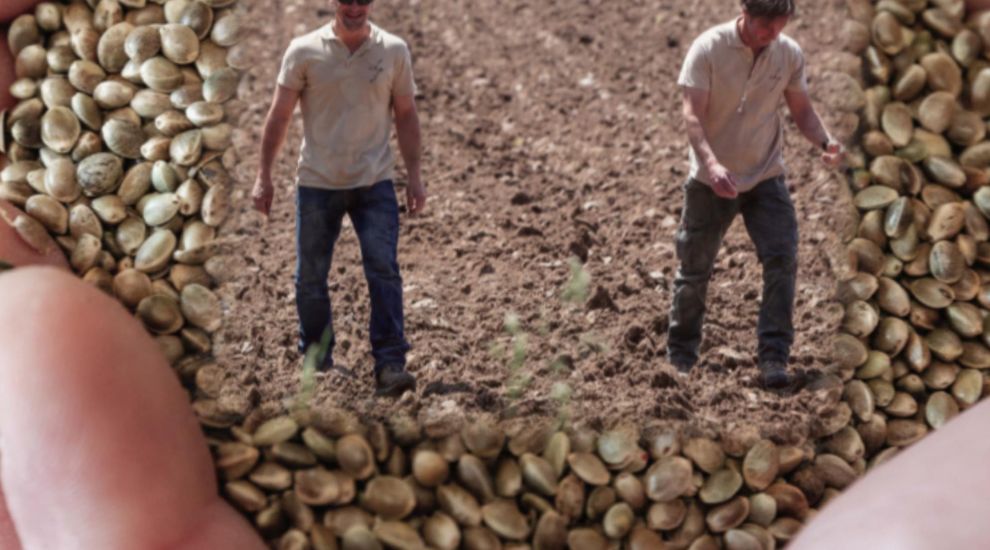

When most people think of cannabis, it’s the controversial, smokable, marijuana leaf – just yesterday legalised in Canada – that springs to mind. But what of its non-psyschoactive brother, hemp?
One blazin’ squad have just brought it to Jersey - the first time in around a century it has been grown in the island - and say that the plant’s golden age could be about to dawn.
Express went to meet them…
When primates are in captivity, they can suffer all kinds of problems due to the complexity of their digestive systems. Often, they don’t get the right amount of fibre they need, which means that – to put it bluntly – what goes in, flows right out.
But, carefully handling a chunky earth-coloured pellet, which crumbles at the touch, Dave Ryan says that he has an answer.
The CEO of Jersey Hemp has trialled feeding this dung-like substance known as ‘cake’ to Jersey Zoo’s gorilla and orangutan population, and claims they “absolutely love it.”
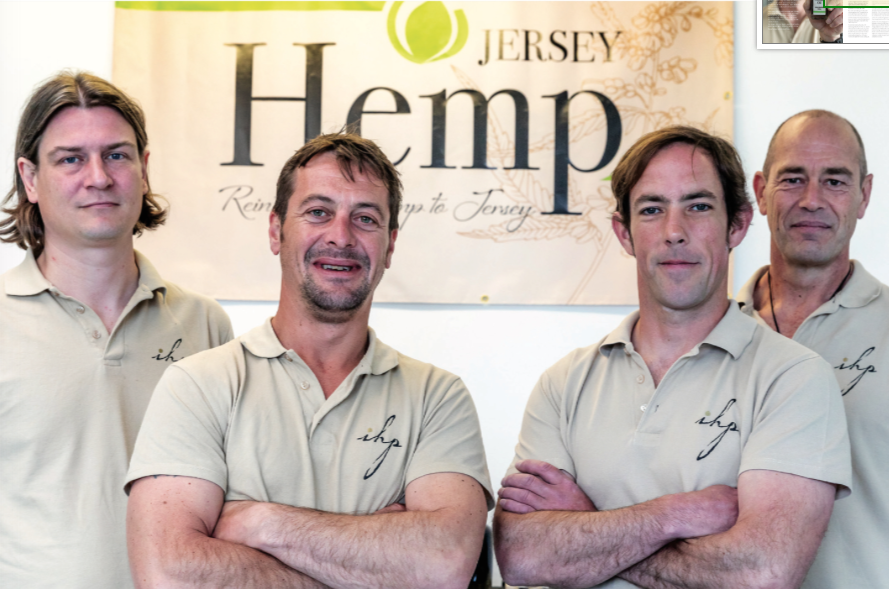
Pictured: The Jersey Hemp team - Chris, Dave, Kevin and Blair.
The primate-feeding by-product of squeezing seeds for oil, which can also be used in protein shakes, is just one of up to 25,000 ‘solutions’ apparently offered by hemp. The Genuine Jersey company, which only officially launched in April, has already mastered two of these: a nutritional supplement and a cooking aid.
The former is CBD oil, which is believed by some to relieve symptoms of pain, anxiety and epilepsy – but the Jersey Hemp team steer well clear of making any medicinal claims.
CBD (cannabidiol) is one of 80 cannabinoids found in cannabis plants, but doesn’t have any mind-altering properties. The ‘controversial’ bit is delta-9 tetrahydrocannabinol (THC). However, the EU-certified Jersey crop has THC content of less than 0.3%, meaning that it would have no psychoactive effect if consumed.
Despite this, Jersey Hemp aren’t yet allowed to extract the CBD from the plant’s leaves and flowers themselves – though hope to do so in future – so this is acquired from an approved US supplier. They’re “looking at putting it in vape form”, but for now the “delivery system” for the CBD is the omega and Vitamin E-rich cold press culinary oil, which has been a standalone success.
Its “light, nutty taste”, COO and ‘Chief Taster’ Blair Jones explains, makes it an ideal replacement for olive oil or a sharp addition to balsamic vinegar.
“I’m keen to try using it for mayonnaise. Because of the omega spectrum it has, it also tends to finish off almost like cod liver oil, but in a palatable way, so you can try and incorporate that into a mayonnaise that you then have with king prawns… But what is really lovely is with black pig. It’s like wild boar – they almost exclusively eat acorns so they have this natural nutty taste that comes through. The hemp oil drizzled over that really compliments it so well.”
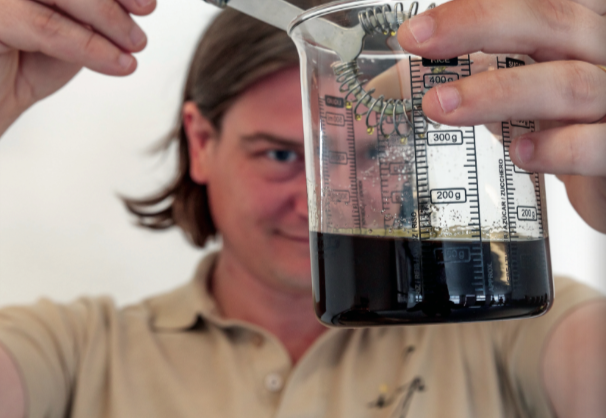
Pictured: Chris, the team's Chief Science Officer, analysing the product.
No wonder, then, that it has aroused such interest. Local luxury restaurants are itching to get their hands on more after being gifted samples, while the team were left with just 20 of their hundreds of first-batch bottles after launching at the Spring Lifestyle Show.
Dave and Blair say it was “amazing” to finally launch the fruit of years of learning, government lobbying, growing, seed drying, cold pressing and bottling by hand.
Hearing the hemp team flick between Michelin-starred vocab and industrial chat, it would never occur that the majority of the team’s backgrounds lie in fire fighting. But it was actually this career that first planted hemp in their minds in 2013.
Researching fireproof building materials, they came across hempcrete – a material made from the plant’s woody core mixed with water and lime. “You put a blowtorch up against it and it will char the outside of the wall, but won’t physically burn through it. And the smoke that it then produces is non-toxic,” Dave enthuses.
Hempcrete’s ability to create “carbon-negative homes” by “locking away all the CO2” was an equal draw – just one of many eco-applications.
It’s an exceptional insulator - “a traditional wall is cold to the touch, so you can run your house about two degrees colder with hempcrete, but it won’t feel that way,” Blair says – and biodegrades easily.
Video: For the first time in over 100 years, a commercial hemp crop is sewn in Jersey.
“If you want to extend your house, you can knock one of the walls down, use 10% of that wall as aggregate for your next mix and chuck the rest in the ground because if hempcrete is left in a moist microorganism area, it will break down over time,” Chief Technical Officer Kevin Mars says.
The absorbency of hemp’s inner core – known as the shiv – teamed with the lime’s alkaline properties also gives hempcrete an anti-allergy benefit. “It’s virtually impossible for bacteria and fungi to grow, so you’re getting less problems with damp, with airborne particles that create a lot of respiratory problems,” Chief Science Officer Chris Callaghan adds.
That absorbent quality makes it an equally strong contender for animal bedding. “You don’t have to muck out as often because it locks in more moisture and smells. We’re looking at doing a service where we drop off hemp in a container to stables, they use it, and then we’ll take it away and use it as a fertiliser for our fields,” says Dave.
That would be one of the few things allowed on their fields, with agrochemicals a big no-no. Hemp also produces large amounts of pollen and nectar so is beneficial for bees, while the nitrogen-hungry crop helps suck nitrates – the pesky molecules polluting the island’s waterways and causing beach-blighting slimy green sea lettuce – out of the soil.
Those environmental benefits make it the perfect soil-replenishing crop to rotate with Jersey Royals. After potato season, the team will therefore rent farmers’ fields to plant hemp.
The practice brings a double economic benefit for farmers: an extra bit of income, and being able to hold onto their government subsidies, which get taken away if they’re found to be overly keen on chemicals. Growing hemp removes the need to use weed killers, as the “canopy” created by the tall plant’s leaves drowns them out naturally.
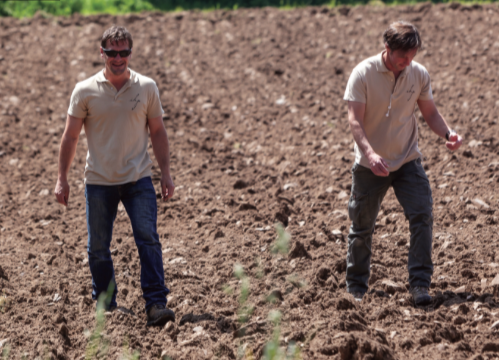
Pictured: Dave and Kevin - both ex-Royal Marines - in the field.
Though rural in nature, Jersey Hemp is still a commercial enterprise. The team has a “rigorous financial flow chart” and a sound grasp of potential profit margins, which, actually, are rather good. “We’ve allowed 20% waste in each field, but we can use every little bit of the hemp plant. It offsets many losses,” Dave says.
“We know the way the market’s looking – there’s going to be a lot of growth,” Kevin adds.
Jersey Business’ Head of Advisory Nick Steel was a key help in getting the professional infrastructure in place. He identified the need to lobby the government right away, and got their foot in the door with the appropriate bods in 2015. That meeting came at just the right time – a States report showing that Jersey’s traditional agricultural sector needed a new crop shake-up had just been published. “It was just coincidence, good timing. They let us continue. We worked towards a trial hemp licence, and grew a small trial last year.”
Without a policy on how to issue a licence, the States turned to the UK Home Office for guidance, who sent over their head of drug and firearms licensing. The result was a permit mirroring the UK’s rules: keep it out of the public’s way, and certainly no growing near schools.
With plenty of flat land to accommodate the plant’s lengthy roots, the ideal site for this turned out to be one originally shortlisted to become the island’s new hospital: Warwick Farm.
But going from firefighting to farming such a large bit of land in a matter of years meant having to learn fast, adapt and overcome difficulties – skills instilled during Dave and Kevin’s prior work in the Royal Marines. That learning included digesting lots of literature, attending the European Hemp Association Conference and networking with global experts. They also teamed with the British Hemp Association – a cooperative where hemp producers can pool their resources to fulfil contracts. It’s expertise gained from partnerships like these that helped make their first ‘secret’ trial crop a success.
Pictured: Trial batches of Jersey Hemp products, including culinary and CBD oils, were launched earlier this year.
Speaking from within an empty warehouse set to become the main processing plant, the pair passionately explain that they’re now looking to double the amount of hemp grown in 2019 from around 50 hectares this year. They’ve already got gargantuan 30-tonne, 8-metre-tall “bullets” for the seeds on their way, and have batch dryer parts from France due within weeks. The new equipment means they’ll be able to process about 100kg an hour of seed – ten times more than what they were able to do previously.
Product expansion is also on the cards. Filtering the oil leaves behind a “muddy” residue, which can be used as moisturiser or in facepacks. “Because of its nutrient content, for the beauty industry, hemp’s the next big thing. We’re looking at making a massage oil of our own – it’s going to take a bit of time to develop. If not, we’ll sell the raw product to the cosmetic industry. And that’s just from the seed,” says Dave.
But before focusing on the product’s purifying capabilities, the farm, whose jungle-like greenhouses were derelict for five years before Jersey Hemp moved in, still needs to be fully cleaned up – a process with an unexpected heritage benefit. Overgrown trees stripped from inside the polytunnels have been donated to La Hougue Bie as part of their project to build an authentic Neolithic Longhouse with ancient tools and materials.
Another unlikely partnership was with disability charity Enable Jersey. They’re providing them with a space to park their minibuses and special access wheelchairs.
Then a short walk from that storage space is a Jersey Tea Company plantation.
“It’s a big site,” Dave states, admitting that a longboard is his preferred method of getting around it. “We’re going to grow into it for sure. We’ve subleased areas that we don’t need, which is good. The kind of people that we’re looking for is niche crops, like-minded diversification start-up companies. We want a thriving little community up here…
“We can make everything from soaps to cars to planes to batteries, so we also want to invite people who’ve got an interest in it. There’s a raw product of hemp that’s going to be available in Jersey now, so if someone’s going to make clothes, baskets, bags, whatever they want, come and see us. Hemp hasn’t been available before and now it is,” he smiles.
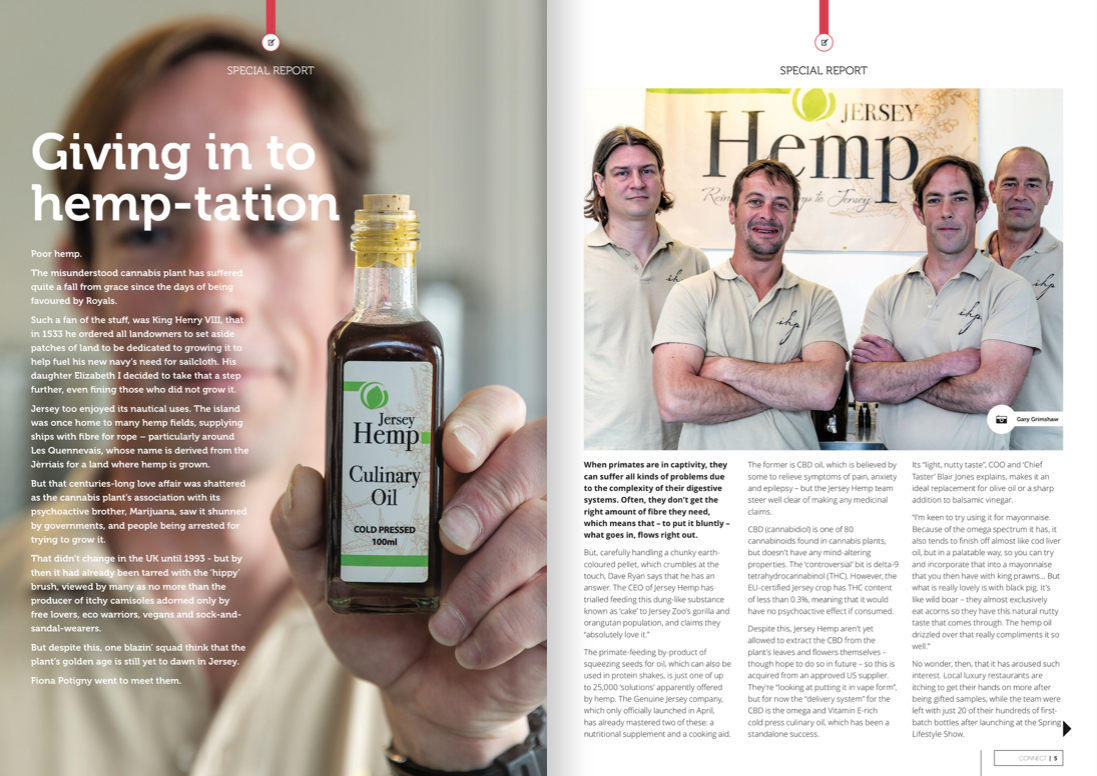
Pictured: Kevin poses with a bottle of Jersey Hemp's cold pressed culinary oil for the June edition of Connect Magazine.
“It’s another industry that employs local people. It’s got everything from working in a field to labs and all the way up. The potential is not just about the environment – it’s the socioeconomic side of things as well where we can add another string to the bow in Jersey and offer more opportunities,” Kevin chips in.
His words will be a welcome message for the farming sector, which has seen employment fall by around a fifth in recent years.
The pair says they’re “excited” for the future, but Dave acknowledges there’s a way to go in “demystifying” hemp for islanders.
“It’s an industrial crop: we can’t smoke it, we can’t get high off it, it’s just a crop, but with a plethora of end uses. We’ve been looking for a negative for the hemp plant for four years, and we just keep finding more positives.”
Read the full interview in Connect Magazine by clicking here.
Comments
Comments on this story express the views of the commentator only, not Bailiwick Publishing. We are unable to guarantee the accuracy of any of those comments.